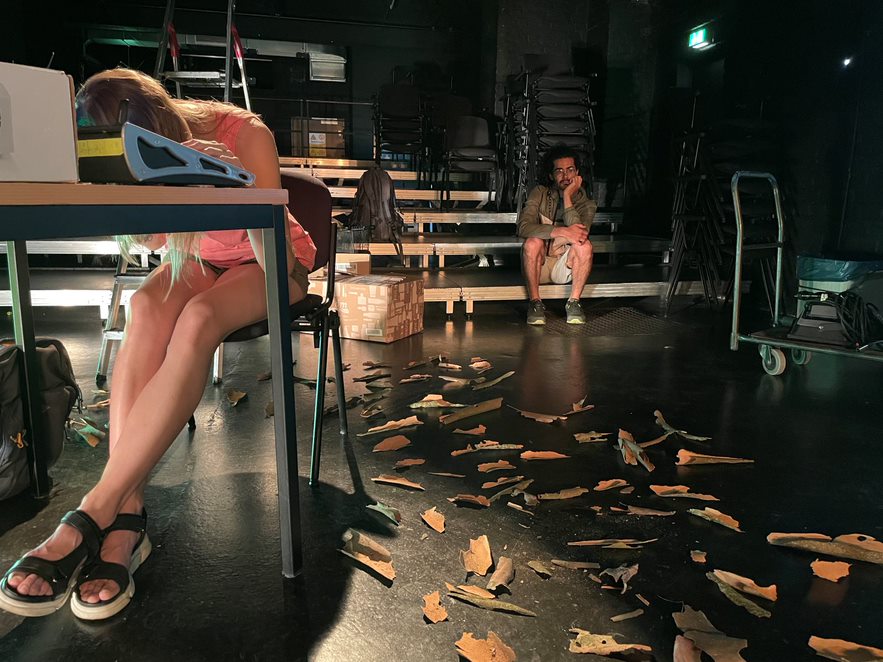
Diana: I start this residency from within the failed the utopia of collective, collaborative work. In trying to answer the questions regarding “our” research and what “we” want to do as a group, I feel that there is not a “we.” Perhaps there is more than one “we”, perhaps there is no “we” at all. There are tensions within the group and with the working conditions, which include a contract in which we are expected to work “together.” What is together? What ways are there of being and working together? Is together a home of relations? Is together the exclusion from home (the self and a room of one’s own)? In view of these tensions, I suggested this logbook should have the form of a dialogue, where individual voices can be heard and aren’t subsumed into a “we” that isn’t. Let the multiplicities be heard. I also suggest that each entity that writes/speaks should have a different colour font to make the multiplicities also manifest visually.
Felipe: Ist ein flüchtiges Zuhause nicht genau der unmögliche Raum des (Wohl)Seins? Eine Umkehrung des Schwellenbegriffs, die das solipistische Subjekt weniger in die Bodenlosigkeit drängt als zu einer sich intensiv beweglichen Exogenese transformiert. Die Herausforderung: eine Szenographie ohne “Ich” zu gestalten.


Bárbara: Wir fangen die erste Woche mit der Suche nach unsere Totenwache als die ultimative Nester. Jede*r hat die Aufgabe die eigene Totenwache vorzubereiten und vorzuzeigen. Was wollen wir hinterlassen? Wie wollen wir erinnert werden? Wofür wollen wir erinnert werden?

Olga: Bei der Inszenierung meiner eigenen Beerdigung hatte ich kurz das Gefühl, zu einer Gruppe zu gehören, zu einer Prozession. Ich habe mich gefragt, wie ich dieses Gefühl der Zugehörigkeit zu einer anderen, parallelen Realität auf der Bühne erzeuge und wie ich diese Erfahrung für das Publikum eröffne? Wie baue ich dieses Nest, welche Form nimmt es an und wo sind seine Grenzen? Wen lade ich dazu ein und wen nicht?
Was tun, wenn man der Leiche einer Anderen sein soll? Sich in den Baum zu verschmelzen.

Gäste und Gastgeber: eine dramatische Improvisation über das Aufeinandertreffen kultureller Codes und Erwartungen
Wir hatten uns in eine Situation versetzt, in der eine Familie ein Flüchtlingspaar aufnimmt, aber es stellt sich heraus, dass die beiden Welten nicht ganz zusammenpassen, weil sie unterschiedlichen Regeln und Ordnungen folgen. Wie leben wir dann zusammen? Werden die beiden Welten dadurch umgestaltet, transformiert, zerstört? Und wenn ein Zusammenleben nicht möglich ist, wie sagen wir als Gastgeber*innen, dass wir es nicht mehr wollen? Für die weitere Forschungsphase werden mich die Zwischentöne dieser Situation interessieren: Wenn es nicht funktionierte, wo waren die kurze Momente der Hoffnung und die Offenheit die dazu beitragen können, solches Leben sich vorzustellen und es zu leben? Wenn die alte oder gelernte und erkennbare Weltordnungen nicht funktionieren , sollten sie vielleicht auf den Kopf oder von innen nach außen gestellt werden?
How do we make ourselves at home? How do we welcome others into our home? Olga’s improvisation score frames the question as a matter of clashing of codes.
The house is not just a house. It’s a city, a country, it’s a street, a job position, a university, a political or scientific or artistic discourse, an art institution, a tax office, a health care provider, a school, a financial institution, etc.
In both improvisations there was a constant need from both guests and hosts to appear welcoming and polite and an attempt to cover the conflict as much as possible. If we are to talk about the limits of empathy and to form genuine and empathic alliances, we need to bring conflict to the table instead of washing it with a multi-kulti multi-color refugees-welcome label.

Aber wie wird dieser Installation zu einem Bewegungsort? Welche Handlungen, Tänzen, Imaginationen können dort verstärkt werden?
Nestbau
Olga hat eine interessante Übung vorgeschlagen, in der wir unser Zuhause mittels Straßenkreide und Papier bauen sollten. Mein Zuhause/Nest habe ich als Spiral gedacht. Ein buntes Zuhause mit viel Bewegung. Mit etwas Schutz, aber gleichzeitig porös, mit strahlende Wurzeln. Mit Eingang und Ausgang.
Am Ende habe ich mich aber gefragt, ob mögliche Verbindungen zwischen unsere Nester geben könnte, ob wir statt individuelle Nester, eine Nachbarschaft bauen können.


In meinem imaginären Nest versuchte ich meine eigenen Wünsche und Bedürfnisse zu verstehen. Es stellte sich heraus, dass mein Nest sehr komplex ist und vieles davon Erinnerungen, Zukunftsprojektionen und parallele Realitäten beinhaltet. Jede*r von uns hat ein solches Nest geschaffen und unsere nächste Frage wäre, ob es irgendwelche Verbindungen in unseren Nestern gibt, gibt es Ähnlichkeiten?


how to extend this domestic, femenine, caring, playful and where-it’s-possible-and-even-fun-to-fail home outside of the confines of the house? (While also acknowledging that the confines of the house aren’t necessarily safe spaces, specially for women and children, as the increased rates of domestic violence during the pandemic demostrated).



Phänomenologisch gesehen ist mein Nest kein Raum, kein Ort, kein Körper, sondern ein Gefühl, das durch gewisse Eindrücke gespürt und vielleicht übertragen werden kann. Ornamentale, botanische und Meer- bzw. Strandmuster als Indizes (Alfred Gell) von Durchströmungen eines Subjekts. Wie eine warme, sonnige Atmosphäre von Innen der Rezipierenden aus zu fördern? Die Theaterwände mit den Zeichnungen zu decken?


Redefining thread 3: Dis_occupy strategies and the limits of empathy
Decolonization’s incommesurability lies in the restitution of indigenous lands and the uncertain futurity of the settlers. That means for example, that the Occupy Wall Street movement, though it’s a movement for social justice is also enacting the colonial project for it is calling to occupy indigenous land. This contradiction asserted my interest in the limits of empathy across different minorities/oppressed populations and what kind of generative conflict can appear. What alliances can occur when we acknowledge these irreconcilable interests?
When approaching homeless people and coming from the theatre, I represent the institution and my project, the dispositif of power through which subjectivies are formed and knowledge is created. Knowledge for whom and by which means? I’d like homeless people to contribute also to the shaping of the questions being asked, not just as subjects with a certain knowledge from which I can draw to answer my research questions.
Questions for next week
What if we experience our own body as a nest? What if we turn it around and think that our body is a nest for many other beings, live bacterias and so on. Is it then possible not to inhabit our body? Can we live somewhere else?
How is it for animals? How to observe and learn with them without an anthropocentric approach? Without a colonial approach? How to decolonize our relations with others, with the world?

flausen+headquarters
Alexanderstraße 124
26121 Oldenburg
flausen+gGmbH
Klävemannstraße 16
26122 Oldenburg
Das überregionale Netzwerk flausen+ wird gefördert von der Beauftragten der Bundesregierung für Kultur und Medien über das Programm “Verbindungen fördern” des Bundesverbands Freie Darstellende Künste e.V.
Gefördert vom Fonds Darstellende Künste aus Mitteln der Beauftragten der Bundesregierung für Kultur und Medien im Rahmen von NEUSTART KULTUR.
Gefördert vom Fonds Darstellende Künste aus Mitteln der Beauftragten der Bundesregierung für Kultur und Medien.



